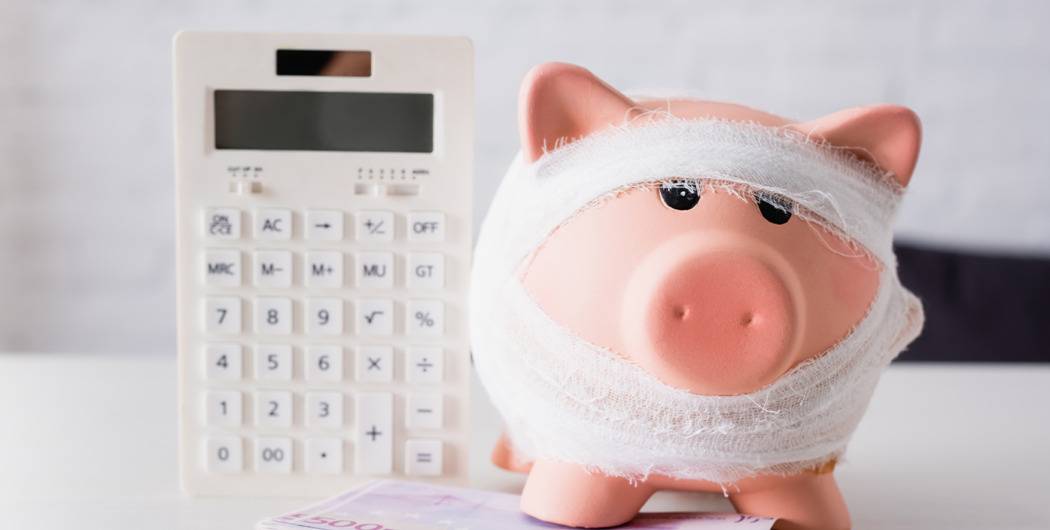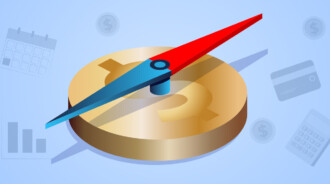

Everyone wants a sense of security, which partly comes from smart capital management. Individuals who are financially competent are better prepared to handle unforeseen expenses and life situations.
Research confirms that financial health affects physical and mental health, so you need all three for comfortable living. According to the Mind over Money survey, 77% of respondents report feeling anxious about their financial situation. And 86% said that their financial situation had made their mental health problems worse.
Here are the signs that your financial health might be at risk:
- You don’t know how much you spend.
- You don’t have any form of alternative income.
- You often take out consumer loans.
- You panic when you have urgent expenses.
Whether you have poor financial health or not, it’s always helpful to take steps to improve it.
1. Pay off your debts
Experts recommend not spending more than 20-30% of your income repaying your debts. 20-30% is the ballpark figure — the point is that your loans shouldn’t be your main expense for the month. It doesn’t apply to mortgages because you’re building up equity. Your debt-to-income (DTI) ratio determines your borrowing risk, mainly for personal loans.
If you have multiple debts, tackle high-interest ones first. If you want to extend your repayment period without amplifying your interest, consider refinancing your loan. Just make sure to consult with a specialist to avoid predatory loans.
Other things to pay attention to when considering new loans are your creditworthiness and capital. To calculate the latter, subtract your total debts from the sum total of your tangible assets (cash, investments, property, savings).
Here are a few ways to manage your debts more efficiently:
- Pay more than the minimum.
- Pay more often than once a month.
- Build a repayment plan.
- Take advantage of balance transfers.
2. Build a financial cushion
A financial cushion (or an emergency fund) is a cash cushion against unforeseen expenses. For example, if you lose your main source of income, you will be able to fall back on this cushion. As long as you have some savings, you won’t be forced to take out debt for immediate expenses, digging yourself into a deeper hole.
To calculate an optimal amount for your financial cushion, consider two things: the worst-case scenario and average spending.
- Estimate how much time you’ll need to get back on your feet. If you lose your job, how much time will it take to find a new job or clients for a freelancing gig? Don’t be overly optimistic — estimate the period based on the worst-case scenario. Generally, you need to plan for 4-6 months.
- Track your regular expenses: housing, food, transport, bills, communications, automatic payments, education, etc. You can use a budget app or just look up the information on your banking app. Multiply this amount by how many months you may be without income.
3. Start a retirement fund
Many people think they have plenty of time to save for retirement until they realize how much they actually need to save. A common guideline is to replace 70% of your annual pre-retirement income.
Of course, you don’t need to save 80% of your salary each payday — that is why you should start early and only save 10-15%. If you’re young, it can double as an emergency fund. So, setting aside funds today is necessary to build up enough for the years down the road.
Use technology to save up! Set up automated deductions from your main bank account to a separate fund that you never touch (although you can set up certain rules and exceptions). If possible, keep your funds in a high-interest savings account.
You can also invest your capital to build more capital closer to retirement. Depending on your risk profile, you can go the “safer” (government and corporate bonds) or the riskier route (dividend stocks, ETFs).

4. Manage lifestyle inflation
Lifestyle inflation happens when people start spending more as they earn more. A little raise here, a bonus there, and you feel that you can afford more, better things. But sometimes, you don’t actually need an upgrade, you just inflate your expenses to prove something.
For example, if you live alone or with a partner, do you really need to rent a bigger house? Or is the two-room apartment you have now enough? Do you need to go halfway across the world on vacation? Do you need the latest car?
Throw that extra income at your debts, emergency savings, or anything else that is actually useful. Don’t be tempted to put up a front of a successful person with extravagant purchases — prove it by reaching your long-term goals!
5. Get insurance
You need insurance to protect your life, health, ability to continue working, and a roof over your head. The lack of medical insurance is, in fact, one of the most common reasons people file for bankruptcy. The stats obviously depend on your location, but the accidents, fires, illnesses, and thefts put people in tough financial situations anywhere.
Prioritize health insurance and liability insurance (properties, cars, businesses, etc.). Just like with a financial cushion, having insurance brings peace of mind, reduces stress through difficult times, and helps you and your family maintain your normal standard of living.
Your individual insurance policy will depend on the insurer’s requirements, the benefits you get, and your ability to afford the premium.
Final thoughts
Here are the main thoughts to take away from this article:
- Financial health affects other areas of your life.
- The basis of financial security is ensured by: small, manageable debts, a financial safety cushion, retirement savings, lifestyle inflation control, and insurance (health, life, home, travel, etc.)
- It’s important to start improving your finances as soon as possible, even if it means taking very small measures.









